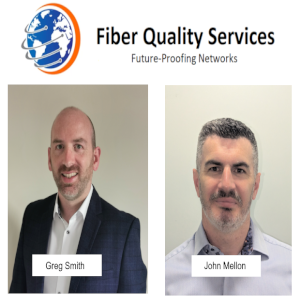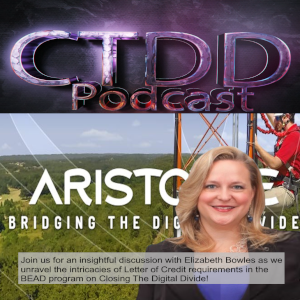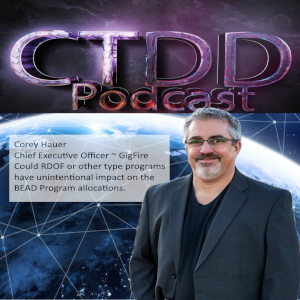[00:00:06] Speaker A: Welcome to today's episode. Before we dive in, a quick shout out to our new sponsor, AGL Information and Technology. If you're serious about staying ahead in broadband infrastructure, AI and everything shaping the digital ecosystem, AGL Information and Technology is your go to source. We're bringing you cutting edge news, insights from industry leaders and practical knowledge on the trends and tech transforming our world. Make sure to check out aglinfotech.com for your weekly dose of thought leadership and stay empowered in our fast evolving digital landscape.
[00:00:45] Speaker B: Now let's get started. Closing the Digital divide. I am excited to have both Greg Smith and John Mellon of Fiber Quality Services here with us today. And we're going to talk about something I think is very, very important and very valid for what's happening here in the industry. With the consolidation of companies. We see companies that are purchasing new companies. One of the things that we're seeing is that companies are having some trouble coming up with a true evaluation of either one company or the other in the sense where the consolidation is going on or just record keeping.
Especially some of these smaller rural companies that kind of started as a little mom and pop and they grew. They didn't really have great record keeping. But you guys have come up with a service through your processes that will help either consolidating companies or companies coming in to make the purchase to validate and give a true valuation of those companies.
How do you guys at FQS ensure that a company's network is recorded and that the information is up to date?
[00:02:08] Speaker C: Yes, Charles, thanks for having us. Yeah, so I suppose in Ireland and the UK we're seeing a lot more consolidation of companies or one company bannered the other company to get a foothold in the network or to get a share of the funding.
And we at FQS we carry out thorough checks on various things and companies. So we'll check all build maps are up to date, straight line diagrams will check splice matrix for example to ensure what is recorded charts is actually build complete and is actually there.
So we can back this up again with field visits and analyzed build photographs of infrastructure.
This charge helps us then in FQS to determine things like cable enclosure, cable sizes, just to name a few.
And we at Fiber Quality Services we can also analyze all testing of fiber ports to ensure that they meet all the relevant requirements for the new investor taking over.
[00:03:08] Speaker B: So I understand you can, you can check all the things, but how do you ensure that the network health is in good shape and also has the ability to either scale or to grow Hi, Charles.
[00:03:27] Speaker D: Yeah, so I suppose that's one of the main issues that arise is companies that are buying out other companies want to know if it has potential to grow. There's no point in buying a company if it's no potential. So we as Fiber quality services check at various points in the network. We'll check the OLT and racks for space for additional cards and ports, SFP capacity, spare fibers for new pond paths and review existing ponds for spare fiber tails to add to the network, ensuring that what capacity is currently available and pinch points in the network. We also assess the network for diversity, thus reducing the downtime to customers when they experience a fiber break.
[00:04:14] Speaker B: So another thing that just came to my mind is licenses. Are you able to check in that process, are you able to check for licenses, whether they're expired, how much time they have on and you know, those sorts of things.
[00:04:33] Speaker C: Yeah, Charles. And again, licenses play the vital part in Faber Build.
We will request and we'll do various checks regarding licenses. So first of all we'll see how many licenses have expired, how many licenses are still valid and how many have been rejected. We also look into things like choices, why have they been rejected? Is there a common trend or is that something can be resolved? Can we get to the bottom of it and can we get that process speeded up? We look for things like Charles, simple things like can you docks go up a grass verge instead of going up a road, for example, and you not need the same license for that. A big thing we've noticed Charles as well over here is ensuring there's good relationships between county councils and build partners for agreeing licences because that process can be speeded up once you've got relationships built.
[00:05:24] Speaker B: So I know we had talked a little bit earlier about the fiber being rented out or fiber currently being rented out to the company. Is that an additional piece that you explore that you check for?
[00:05:42] Speaker D: Yeah. So Charles, this is another component in this whole process.
We at Fibre Quality Service can review current rental agreements of fibers in a Metro backhaul link and contractual deadlines with that. We can also analyze current splicing to see if it's possible for the company to create their own backhaul route and potentially lease out dark fibers to other operators, which can generate an income that may not, that may, sorry, have been overlooked previously.
[00:06:13] Speaker B: So how do you determine if a company has a shared network or what part of the network do they actually own?
[00:06:23] Speaker C: Yeah. So Charles, again our team here at Fiber Quality Services, we examine current shared network routes, overhead network compose, ug duct space and radio tars, we check for various solutions charts like tar congestion, for example. Is there redundant equipment on that tar that can be recovered? Is there weight limitations on the tar? So can recovered equipment on the tar. See if money being spent on tar strengthening.
And does that company have infrastructure available to lease, for example? So can you lease out poles, can you lease out space in your tars, can you lease out ducts? And can you lease out spare favors? So, again, Charles, we believe doing this background checks can have massive potential for companies looking to invest or looking to take over to get a foothold in the fiber network.
[00:07:17] Speaker B: So I know this is kind of a rhetorical question here, and I know we really didn't talk about this earlier, but what if a company, what happens when a company doesn't do their due diligence or they don't go down to the level that we've just been discussing here? What, what have you guys seen as you've visited many, many companies over there across the pond?
[00:07:45] Speaker C: Happens a lot, Charles, when you don't budge your do your homework and you don't do your research, it's never a good end. Never. There's nobody, there's nobody looking to sell their cost or a company to an investor and undervalue it. It's nearly always overvalued. So we do the groundwork to make sure that the true value for the investor on the seller is actually achieved.
[00:08:08] Speaker B: So do you guys put this in a, I'm guessing you put it in some type of report or is there, is there a process where you discuss Because I can just see a potential buyer and the seller. Of course, the seller wants the valuation, the value to go up and, and the purchaser wants it to be fair. But, you know, not at the very top at the end of your examination, is there a report that goes out and is there an opportunity for a little bit of back and forth on that?
[00:08:52] Speaker A: Yeah.
[00:08:53] Speaker D: So, Charles, I suppose we will give, we give a full report from the technical side of things on what we see is the value of the company, what you can do with that company when you buy it, plans to expand it or join it up with another network.
But we'll also sit down with both parties because we're independent, which is the best thing. We're independent from both of them. So we'll sit down with both parties and explain where we got our findings from, how we got them and why they're some people believe they're undervalued, maybe some people believe they're overvalued we explain why we came up with this value.
[00:09:28] Speaker B: So I'm assuming then there's an actual number that you would put on as a value for the network based on your experience, Correct?
[00:09:38] Speaker C: Yeah. And the big thing you said earlier, Charles, was making sure it's fair and independent.
So the seller will always have probably an over expected value of their company. But communication is key. Sitting down with them, explaining where our value has come from and give them a realistic view of the current market and the network to have and the customers that they have and the current value of that. And again, in turn having constant communication with the investor because sometimes it can be undervalued. And you're explaining where we got our value from to them as well. And hopefully then there's agreement between all parties and it can be signed off.
[00:10:21] Speaker B: So after you've done the evaluation and you've had the conference, if you will, what is the next step?
I'm guessing you guys are pretty much done at that time and leaving it up to the parties or is there another opportunity for them to come back to you and say, hey, we're looking to scale in this area.
What are your opinions based on?
Or can you apply additional services to help us to scale out on these?
[00:11:00] Speaker D: Yeah, so we'll always make ourselves available, Charles, because we know that with some of these things, they don't always go to plan. A lot of time they fall through. There's great intentions on companies to buy out and one company to sell, but it doesn't always work like that. But if it does, and the company that buys out the other company want to speak to us about expansion of that, we can look into what's available there at the moment and how they would expand, how they would build their network because let's face it, they're all in it to build a network and build a bigger network. It's all about growth.
[00:11:32] Speaker C: Yeah. And our service can help them grow as well. Sure. As our independent verification of their testing, our design management team can help them. Our final accounts for reporting what materials have been used against what's actually in the field. All the services we have on our
[email protected] is all there to have any company versus available.
[00:11:59] Speaker B: All right. I think you froze there on me. I don't know if it was on my side or your side there, John. You froze a little bit. But I'm going to try to recap what you just said, that obviously there's other services that you guys provide and someone could go to your website or.
Yes, 100% really give you guys a call and talk through. I think it's a very valuable service that you guys are providing. I know we've talked to several companies that are looking to consolidate or be purchasing that big question of the valuation always comes up and how do you validate that? Right. And so. Or how do you validate that on. Based on today's value. But also there's expansion part, you know, involved in that. Okay, what's the valuation going to be after we do this? So thanks. Very, very important services you guys are delivering. And I think, you know, many people would want to at least take advantage of knowing what exactly is the network we're buying because I've seen a number of folks that have. That are purchasing or looking to purchase companies that are across the country. Right. And they don't have a real sense of what that, what that company's worth is or the network is unless they actually go out and make that trip.
But you guys can do that through remote access, correct?
[00:13:35] Speaker C: Yeah, yeah. All remote charts on its.
Yeah, it's just, it's just ensuring, like you mentioned, value. Value is key, but you get the value right. And also showing the new investors the potential for the company they're taking over as well. With dark fibres with potential to build metro backhaul roofs that you can lease out with space and tars. Maybe they're taken over that can be rented out. Highlighting redundant equipment, all the stuff we'll talk about that all leads in the potential for growth.
[00:14:11] Speaker A: Before we wrap up today's episode, let's talk a little bit about our new sponsor, AGL Information and Technology. If you're passionate about broadband, tech, innovation, infrastructure and how federal programs are reshaping the digital landscape, AGL Information and Technology is your essential resource. Each week, AGL InfoTech brings you deep insights, timely news and expert perspective on the front lines of digital transformation. Explore the latest AutoCAD on broadband advancements, AI applications and strategies for navigating the evolving tech ecosystem, all with one goal. Empowering you with knowledge. Ready to stay informed and inspired? Visit aglinfotech.com and be part of the conversation that's shaping the future.
[00:15:03] Speaker B: All right, well, fantastic. Is there anything else that you guys want to see share before we jump off here? We got about 30 seconds left.
[00:15:13] Speaker D: No dissolving charts. Yeah. All to remember is just check out our website, www.fibre qualityservices.com or email us at infoiber qualityservices.com all right, there you go.
[00:15:27] Speaker B: Get your company checked out before you make a purchase, before you do consolidation. And really, I just thought of this.
If I'm a seller, this would be a good service that I can validate the value of my company before even someone. So it can work on both sides.
[00:15:47] Speaker C: Yeah, 100%.
[00:15:50] Speaker B: All right. Well, guys, thank you very much. Appreciate you taking the time out of your busy schedule to jump on here and talk about technical due diligence. That is awesome. We need to do more technical due diligence, I think.
[00:16:04] Speaker C: Thanks, guys.
[00:16:06] Speaker B: I appreciate it. Have a good day. We'll talk soon.
[00:16:09] Speaker D: Thanks, guys. Bye.




